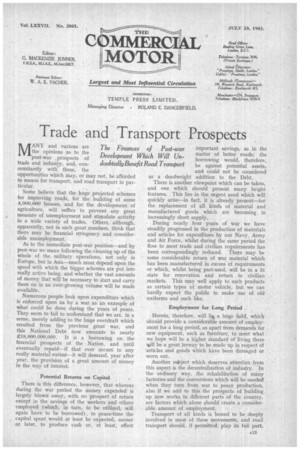Trade and Transport Prospects
Page 15

If you've noticed an error in this article please click here to report it so we can fix it.
MANY and various are the opinions as to the post-war . prospects of trade and industry, and, concomitantly with these, the opportunities which may, or may not, be afforded to means for transport, and road transport in particular.
Some believe that the huge projected schemes for improving roads, for the building of some 4,000,000 'houses, and for the development of agriculture, will suffice to prevent any great measure of unemployment and stimulate activity in a wide variety of trades. Others, although, apparently, not in such great numbers, think that there may be financial stringency and considerable unemployment.
As to the immediate post-war position—and by post-war we mean following the cleaning up of the whole of the military operations, not only in Europe, but in Asia—much must depend upon the speed with which the bigger schemes are put into really active being, and whether the vast amounts of money that will be necessary to start and carry them on in an ever-growing volume will be made available.
Numerous people look upon expenditure which is enforced upon us by a war as an example of what could be done during the years of peace. They seem to fail to understand that we are, in a sense, merely adding to the huge overdraft which resulted from the previous great war, and this National Debt now, amounts to nearly £18,000,000,000. It is a borrowing on the financial prospects of the Nation, and until eventually repaid—if that ever occurs to any really material-extent—it will demand, year after year, the provision of a great amount of money in the way of interest.
Potential Returns on Capital There is this difference, however, that whereas during the war period the money expended is largely blown away, with no prospect of return except in the savings of the workers and others employed ('which, in turn, to be utilized, will again have to be borrowed), in peace-time the capital spent would at least be expected, sooner or later, to produce cash or, at least, effect important savings, as in the matter of better roads; the borrowing would, therefore, be against potential assets, and could not be considered as a deadweight addition to the Debt.
There is another viewpoint which can be taken, and one which should present many bright features. , This liesin the urgent need which will quickly arise—in fact, it is already present—for the replacement of all kinds of material and manufactured goods which are becoming in increasingly short supply.
During nearly four years of war we have steadily progressed in the production of materials and articles for expenditure by our Navy, Army and Air Force, whilst during the same period the , flow to meet trade and civilian requirements has been correspondingly reduced. There may be some considerable return of war material which has been manufactured in excess of requirements or which, whilst being part-used, will be in a fit state for renovation and return to civilian markets. This may well apply to such products as certain types of motor vehicle, but we can hardly expect the public to make use of old uniforms and such like.
Employment for Long Period Herein, therefore, will lit, a huge field, which should provide a considerable amount of employment for a long period, as apart from demands for new equipment, such as furniture, to meet what we hope will be a higher standard of living there gill be a great leeway to be made up in respect of articles and goods which have been damaged or worn out.
Another subject which deserves attention from this aspect is the decentralization of industry, In the ordinary way, the rehabilitation of many factories and the conversions which will be needed when they turn from war to peace production, also if we add to this the prospects of building up new works in different parts of the country, are factors which alone should create a consider able amount of employment. _ Transport of all kinds is bound to be deeply involved in most of these movements, .and road transport -should, if permitted, play its full part.




















































